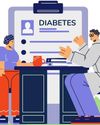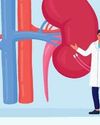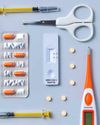
US data shows that almost half of all US adults aged 45 and older have risk factors for dementia that could be easily reversed. Not doing so is a massive missed opportunity. Looking after your brain translates pretty well into looking after your heart. It seems that there is mounting evidence that when it comes to brain health, what we do to protect - or trash - our health in midlife matters more than what we do in old age. I'm definitely not saying that if you wait until 70 to overhaul your health, get fit and get a cholesterol check, that it's game over. But the best returns for your brain health are definitely when you're younger, in midlife.
deafness
I'm starting here because this condition, perhaps unexpectedly, has the most profound impact on your risk of dementia. More than smoking, diabetes or high blood pressure.
A massive meta-analysis of studies was done in 2017 and was later updated to include even more trials in 2020. It was published in the prestigious medical journal, The Lancet. It named hearing loss as the single biggest risk for cognitive impairment and dementia.
Research is ongoing as to why this is such a significant indicator of the development of dementia. The authors pointed to a small US prospective cohort study of 194 people aged on average 54 to 55 years with normal cognition. They had at least two brain MRIS, on average 19 years apart. The study found that people with midlife hearing impairment measured by audiometry had steeper temporal lobe volume loss, including in the hippocampus. The current theory is that hearing loss just reduces brain stimulation and this might be the direct cause of cognitive impairment and dementia.
high blood pressure (AKA hypertension)
This story is from the {{IssueName}} edition of {{MagazineName}}.
Start your 7-day Magzter GOLD free trial to access thousands of curated premium stories, and 9,000+ magazines and newspapers.
Already a subscriber ? Sign In
This story is from the {{IssueName}} edition of {{MagazineName}}.
Start your 7-day Magzter GOLD free trial to access thousands of curated premium stories, and 9,000+ magazines and newspapers.
Already a subscriber? Sign In

A whole new world
Being diagnosed with type 1 diabetes as an adult can be a challenging and confusing time. In this extract from the JDRF's new book, Straight to the Point, they explain what's going on and what to say to people who make uninformed comments about your condition

5 Days 5 Dinners
Weeknights are sorted with these fresh, flavoursome mains, packed with veg!

Fantastic Feta
This soft, white cheese with Greek origins is versatile and packs a flavour punch, with only a small amount needed to jazz up a dish

My story: "I'm proud of the fact that I've gotten hold of my health"
When Natalie Rixon, now 33, discovered she had prediabetes soon after she'd turned 20, it was a shock and a relief all rolled into one. What she did next changed her future.

INTERPRETING YOUR cgm DATA
A continuous glucose monitor is a wonderful source of information but do you really know what you're looking at?

7 NEED-TO-KNOW FACTS ABOUT...diabetes & kidney disease
Diabetes is the most common cause of Chronic Kidney Disease. Learn more about this condition and how to protect yourself from developing it.

GET OFF THE diet ROLLERCOASTER
Dietitian Lyndi Cohen wants you to take a deep breath and think about your weight, and health, in a whole new way.

WHAT IS Wegovy?
Meet Wegovy, the new once-weekly weightloss injection that research shows helps people lose significantly more body weight than those using diet and exercise alone.

MEDICATION & CONSUMABLES
Insulin is available on the Pharmaceutical Benefits Scheme (PBS).

DOLLARS AND DIABETES
When you have type 1 diabetes, it's important to see a variety of health professionals regularly to keep your health on track.